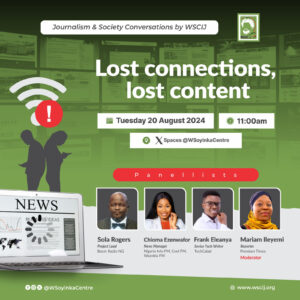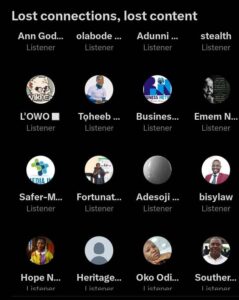In a conversation hosted by the Wole Soyinka Centre for Investigative Journalism (WSCIJ), Senior Tech Writer at Tech Cabal, Frank Eleanya, revealed Nigeria’s position on the Global Digital Competitiveness Index.
According to him, Nigeria lags behind as 125th out of 137 countries, while South Africa stands at a commendable 58th position, clearly leading the digital charge in Africa.
During the discussion on the theme, “Lost Connections, Lost Content,” he emphasised how internet quality directly influences journalistic practices, including news gathering and audience engagement.

“Nigeria is not even among the top five,” Mr. Eleanya remarked, highlighting the urgent need for a robust digital infrastructure in the country.
“Without a digital backbone, connectivity which is crucial for the news industry looks unattainable.”
During the conversation, Eleanya also critiqued the telecommunications sector, dominated by MTN, Airtel, and Glo.
He explained that inadequate investment in the sector has led to poor service delivery. “Since there is no investment going into telecommunications, this has posed significant losses.
“Compounding these issues, government policies and economic instability have exacerbated service disruptions. He said.
Eleanya cited the aftermath of electricity privatisation in 2022, which promised extended power supply yet has failed to materialise.
“The telecommunication industry produces its own electricity without help from the government, and rising diesel prices only deepen their struggles,” he noted.
Highlighting the negative impact of the Nigeria Communications Commission’s (NCC) tariff policies, he pointed out that stagnant price adjustments hinder industry growth, particularly affecting new infrastructure development.
The keynote speaker, Samson Ademola reinforced the critical role of the internet in media operations.
“Stable connection is not about convenience but necessity. Disruptions can be devastating, as the internet is our gateway to the world,” he explained.
He stressed that the media’s reliance on timely, accurate information makes a reliable internet connection indispensable.

News Manager at Nigeria Info FM, Cool FM, Wazobia FM and a Panelist, Chioma Ezenwafor, expressed her concern over disruption of internet connection. “When the internet is slow, it becomes saddening to behold,” she said, underscoring the urgent need for timely news dissemination.
Speaking further, she described how lost connections leads to spreading misinformation and disconnecting audiences from essential news.
Responding to queries about how her station manages internet accessibility, she detailed both the dependence on in-house networks and challenges faced during unexpected outages.
The conversation, which attracted over 100 virtual attendees-including journalists, students, and human rights activists underscored an urgent call for improved digital infrastructure in Nigeria, a step essential for enhancing media trust and sustainability in today’s digital-first landscape.


